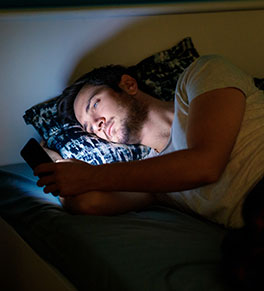Sleep, immunity and COVID-19

Can a good night’s sleep boost your immune system?
Can occasional tossing and turning while worrying about the novel coronavirus pandemic do damage to your immune system?
The answer to both is “not really,” says UCI Health psychiatrist Dr. KyoungBin “Kevin” Im, who specializes in sleep medicine.
Yes, a pattern of restful sleep is important for our immune system to function properly. But there is no great way to measure when or how the immune system is functioning optimally, or any specific actions or supplements that can boost it to ward off COVID-19 or other infectious diseases.
“In relatively healthy people, there are no good markers to tell us how good or bad our immunity is,” explains Im, an associate professor of psychiatry and human behavior at UCI School of Medicine. “I would even say that there is no such thing as ‘good immunity or bad immunity. Too much immune response can actually do harm.
"For example, when the immune system attacks the body in autoimmune diseases, it results in inflammatory responses that can be detrimental, which is what we see in some of the COVID-19 patients with respiratory failure."
Innate vs. adaptive immune systems
Instead, Im says, it’s more accurate to understand that it is sleep deprivation that negatively affects our immune system’s ability to prevent viruses from entering and spreading throughout the body.
Recent media reports say sleep boosts immunity. They point to studies that suggest than even a single good night’s sleep can help activate immune responses to fight off specific pathogens. They’re talking about the body’s second line of defense, which doctors call the adaptive immune system, designed to attack specific pathogens such as flu, cold or COVID-19.
Although that sounds exciting for fighting the novel coronavirus, Im cautions, “Not so fast.” He recently reviewed many studies on sleep and the immune response and believes findings from multiples studies are not consistent enough to be definite science.
“There is no strong evidence that sleep affects the adaptive immune system,” he says.
Sleep deprivation linked to immune response
Research has demonstrated, however, that sleep deprivation hurts the body’s first immune response, or the innate immune system, which acts immediately to prevent the spread and movement of foreign pathogens.
One example is a study of exposure to the common cold virus exposure among two groups, one that had more than 7 hours of sleep and the other with less than 6 hours of sleep. The group that got less than 6 hours of nightly sleep for a week before exposure to the virus were four times more likely to be infected than the group that got more than 7 hours of nightly rest.
“The innate system works at the beginning,” Im explains. “It doesn’t care what type of organisms are infecting you. Chronic partial sleep deprivation may negatively affect this innate immune system more than the adaptive immune system.”
Dr. Ruth Benca, chair of the Department of Psychiatry & Human Behavior, pioneered studies in the 1980's and 1990's revealing that sleep deprivation may be detrimental to this first-response immune system. Her work demonstrated no harm, however, to the adaptive immune system, which is the second response the body makes to combat specific threats like viruses.
“The white blood cells or proteins that are working as a barrier in innate immunity may be affected by sleep deprivation,” Im says. “Much of her work still stands in light of subsequent research.”
The real damage comes for long-term sleep deprivation, Im explains. That’s not surprising given how stay-at-home orders and fear of COVID-19 are upending jobs, school and family life.
“People shouldn’t worry about not getting a good night’s sleep for one night or a couple of nights in these anxiety-provoking times.”
Consistent restful sleep
Whether you are trying to turn around chronic problems with sleep or deal with getting a good night’s rest, Im recommends good sleep hygiene. Here are some strategies for a 24-hour-a-day practice:
- Get up at the same time every day no matter what, even when you go to bed later than usual. This is especially important now when normal schedules are disrupted.
- Get exposure to sunlight. Take a walk or at least sit outside. Exposure to light in the morning — even on a cloudy day — resets your brain clock. Without it, your circadian rhythm and sleep-wake schedule will be delayed.
- Limit caffeine after 2 p.m.
- Exercise in the late afternoon or evening, but at least four hours before bedtime. Cooling down the body after exercising promotes good sleep.
- At night, use the night mode on smart phones and tablets. But avoid LED screens and monitors of any kind within one to two hours of bedtime, especially nowadays when much of what we are watching is anxiety-provoking.
- Go to bed when you’re ready to sleep. Try to set a bedtime that will get you seven or eight hours of sleep. But if you’re not sleepy, don’t get into bed until you are. Don’t worry if you won’t get seven or eight hours of sleep on any given night. That just makes it more difficult to fall asleep. You can make up for sleep loss in naps the next day if need be.
Im suggests trying to set aside 30 minutes earlier in the day for worrying and limiting yourself to that period.
For many people, that is easier said than done. For those who need help, UCI Health Sleep Medicine Services providers are able to schedule telehealth visits.
Related stories
- Caring for COVID at home ›
- When to see a doctor about COVID ›
- Disinfecting your home to kill viruses ›
- Coping with the stress of COVID-19 ›
- Blood donors needed to ease COVID-caused supply shortage ›
- Protecting cancer patients from COVID-19 ›
- What does social distancing mean? ›
- Keeping seniors safe ›




